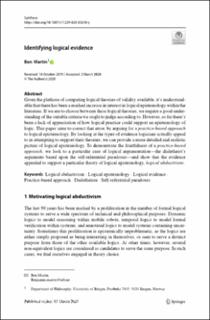Identifying logical evidence
Journal article, Peer reviewed
Published version

Åpne
Permanent lenke
https://hdl.handle.net/11250/2729994Utgivelsesdato
2020-03-13Metadata
Vis full innførselSamlinger
- Department of Philosophy [240]
- Registrations from Cristin [9791]
Sammendrag
Given the plethora of competing logical theories of validity available, it’s understandable that there has been a marked increase in interest in logical epistemology within the literature. If we are to choose between these logical theories, we require a good understanding of the suitable criteria we ought to judge according to. However, so far there’s been a lack of appreciation of how logical practice could support an epistemology of logic. This paper aims to correct that error, by arguing for a practice-based approach to logical epistemology. By looking at the types of evidence logicians actually appeal to in attempting to support their theories, we can provide a more detailed and realistic picture of logical epistemology. To demonstrate the fruitfulness of a practice-based approach, we look to a particular case of logical argumentation—the dialetheist’s arguments based upon the self-referential paradoxes—and show that the evidence appealed to support a particular theory of logical epistemology, logical abductivism.
